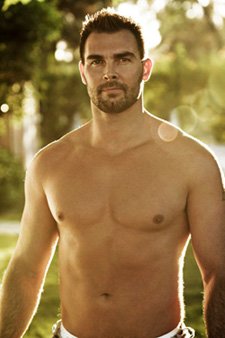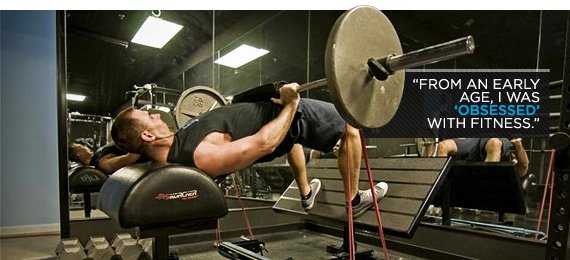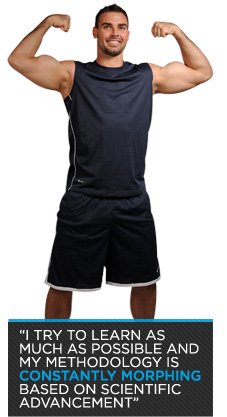I've lived in Arizona my entire life. I have an identical twin brother and an older sister. I received my bachelor's degree from NAU and my master's degree from ASU. I taught high school mathematics for six years in the Scottsdale Unified School District.
During this time, I was also a certified personal trainer and had a good personal training business on the side. I received my CSCS from the NSCA around eight years ago.

I left teaching to open up my own strength training facility and came up with some very unique methods, especially for glute training.
I always wanted to write a book and start writing for various fitness publications, but I was too busy training clients all day long.
One day I decided to close my facility and move it back to my garage so I could limit the number of clients I trained to make more time for writing. I wanted to "train the trainers."
I wrote an eBook, started up a blog, became active on Facebook, Twitter, and Youtube, and started cranking out articles left and right for various fitness sources.
I'm working on obtaining my PhD in strength training in New Zealand. They have one of the best universities in the world for strength and conditioning research.
Like most fitness professionals, from an early age on I was "obsessed" with fitness. I read everything I could get my hands on. I loved helping people transform their bodies and embark on a healthier lifestyle.
Since I was 16-years old, I've been helping people either as a training partner, a personal trainer, a strength coach, or a writer.
I'm an "everything guy." I don't have one particular method. Depending on the goals of the client, I blend together bodybuilding, powerlifting, Olympic weightlifting, strongman, sport-specific, and physical therapy methodology.
In general I believe in getting people strong with good form on the biggest, most basic exercises, including squats, deadlifts, presses, rows, etc.
I'm most known for developing "great glutes." Some of my glute exercises have become very popular, and EMG technology has shown the exercises to outperform squats, deadlifts, and lunges in mean and peak gluteus maximus activation.
The hip thrust, in particular, has sky-rocketed in popularity and is being used by most popular strength coaches in the profession.

Of course, any good trainer who has been around for a while has plenty of success stories. I've helped three different people lose over 80 lbs, one of whom lost 105 lbs. I've trained figure competitors, professional sports players, as well as everyday folks.
I've train my niece for several years. She's a 14 year old volleyball player who is the best player in her school, with the highest vertical jump and best agility on her team.
I have a 65-year-old client who could barely walk when she came to me and now she's moving around like a 30-year old.
I had one client (actually a trainer who worked for me) who was scheduled to have back surgery, and had seen a doctor, physical therapist and chiropractor. I convinced him to train with me for a few weeks to see if I could help and within two weeks his back pain vanished. He avoided low back surgery and has been training heavy every week since then, which was more than three years ago.
I enjoy training individuals from all walks of life.
In the past couple of years I've worked with figure competitors Kellie Davis, Katie Coles, and Lizzy Ostro.
Well, let's say I'm training a figure model who needs to bring up her glutes and hamstrings. She's probably accustomed to following a high volume body part split routine that has her working her lower body once or twice per week. I will move her to a full-body routine that targets her lower body every single workout and focuses on progressive overload.
I have had tremendous success with this type of programming. As for diet, obviously it all depends. I usually set the protein and fatty acid requirements, and then tinker with carbohydrate intake to find the optimal balance.
When dieting down, I slightly increase protein intake while dropping carb intake. Food intake usually involves lean meats, fish, eggs, green veggies, nuts, olive oil, greek yogur, fruit, dairy, oats, and whole grains.
Supplements include whey protein and fish oil capsules.
Most exercises can be performed safely assuming that proper mechanics are adhered to and proper programming is in place. Many lifters are "all jacked up." Their shoulders ache, their low back hurts, their knees hurt, etc.
This is all preventable. Many lifters lack proper mobility and end-range joint stability to properly perform various exercises. They lack shoulder mobility so they start doing partial range military press. They lack ankle or hip mobility or hip stability so they start doing partial range squats.
Their hamstrings are tight so they round their back on deadlifts. Their glutes don't activate well, and they don't know how to properly stabilize their core during various movements.
As soon as they learn proper form, increase their mobility, strengthen weak stabilizers, and develop good motor control, pain goes away. All of a sudden movements that were problematic are now okay. And as long as proper programming is in place and volume is kept in check, the athlete can lift pain-free week in, week out, indefinitely.
Stress can be good (eustress), or bad (distress). The key to lifting is to stay in eustress and stay out of distress.
Most only learn one set of skills. They aren't "students of the strength training game." They might learn everything about bodybuilding, or powerlifting, or training for football players, etc.
In order to be the best trainer possible, you need to learn physical therapy techniques so you can screen and assess your clients properly. You need to know how to maximize hypertrophy, strength, power, speed, agility, conditioning, etc.
This requires knowledge from multiple sub-fields within the strength training umbrella. Rare is the trainer who is well-rounded and well-versed in multiple techniques.
Yes, I do.

In my experience, all you have to do is get them seeing results. As soon as the pounds start shedding and muscles start firming up and popping out, all of a sudden the client starts receiving compliments from friends, family, and co-workers. Clothes start fitting differently, etc. This fuels their fire and further increases motivation.
I also teach the clients how to log their workouts and check previous records to ensure progressive overload. Beginners typically beat records every workout for months in a row without slowing down. When they see that their previous record was six rack pulls with 95 pounds and they get ten reps, they learn to equate progression with physique-results.
These things help motivate the client, even though you (the trainer) aren't doing anything. If I was in their faces yelling at them during every rep, it would be "too much" and over the top. I definitely push my clients and force them to train hard, but I try to save the times where I'm in their face yelling, "Come on, one more rep!" for the perfect moments.
I also try to motivate them to stay on their diets during times when most people stray, such as during holidays and celebrations.
Yes! Research has shown that they don't get taxed as much during various exercises and can therefore train more frequently. Research shows that women lifters can actually possess larger type-I fibers than type-II fibers, so I always incorporate high reps, medium reps, and low reps in their programs.
I hammer their glutes every workout as this is the area that truly separates a woman from the pack. Women typically have better mobility than men and don't need to do any stretching or mobility drills, whereas men do well with a dynamic warm-up that incorporates various mobility drills.
Men typically have better stability than women and don't need to do as many stability or activation drills, whereas women do well with these methods.
With men, I'll employ exercises that I'd rarely if ever prescribe a female, such as shrugs. I prescribe more isolation work for the upper body for men. Really it all depends though, as every client and athlete has unique goals and needs.
Of course! I'm always reading journal articles, blogs, and books by other fitness professionals. I try to learn as much as possible and my methodology is constantly morphing based on scientific advancement.
My "big rocks" never change, but the pebbles change dramatically over the years.
I have a detailed form they fill out, I have a discussion with them to obtain better information, and I put them through a screen that involves testing their functional movement patterns and joint ranges of motion.
I love both. I find that women tend to be more appreciative, more trusting of their trainers, and more expressive of their gratitude. But every trainer loves developing freaks, and nobody can deny that men are stronger and more powerful.
I trained a guy named Kenny Dobbs for a couple of weeks. He's a slam-dunk competitor with a 48-inch vertical jump. He can kiss the rim. That was fun!
I've been lucky - in the past couple of years my clients have been emotionally stable and haven't required much psychological intervention. In the past I've definitely felt this way, and some figure competitors tend to have issues that require attention. I typically have to get them out of the "torture is good" mentality.
I've trained women who trained four hours per day and never consumed anything tasty whatsoever. They were so relieved to find that they can make better progress by not training so much, and to find that they could eat things that they enjoyed and still get the results they wanted
